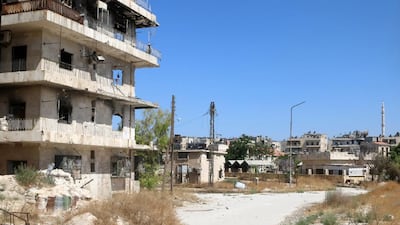GENEVA // An offer from Russia to open up “safe corridors” out of Aleppo did not work. Only a few hundred of the 300,000 civilians in rebel-held areas of Syria’s largest city managed to escape before rebels forced them back.
And on Friday the UN special envoy for Syria urged Russia to leave the creation of humanitarian corridors around Aleppo to the United Nations and its partners, issuing a gentle snub to Moscow, which had made the proposal a day earlier as pro-government troops tightened their encirclement of rebel-held parts of the northern Syrian city.
Staffan de Mistura said he was not consulted on the proposal, which was first announced by the Russian defence ministry.
“That’s our job,” he said. Humanitarian corridors were good “in principle” but the circumstances had to be right. “How do you expect people to walk through a corridor – thousands of them – while there is shelling, bombing, fighting?”
Civilians trapped in opposition-held neighbourhoods in eastern Aleppo reacted critically to Russia’s plan, saying it does not guarantee safe passage or give residents a choice of where they flee to. Some residents fear the proposed corridors are intended to restore government control over parts of the city that have been in rebel hands since 2012.
Mr de Mistura said he was awaiting clarification from Russian authorities about the plan. “The clock is ticking for the Aleppo population,” he said. “No one should be forced to leave Aleppo, but if they do, it is crucial that they be given the option of leaving to areas of their own choice.”
By Friday only a few Aleppo residents had left eastern areas through one passage but others wishing to flee were prevented by rebels, said the head of the Britain-based Syrian Observatory for Human Rights.
“Around 12 people managed to use the Bustan Al Qasr corridor before rebel groups reinforced security measures and prevented families from approaching the corridors,” said its director, Rami Abdel Rahman.
The streets remained empty on Friday morning, with residents staying indoors. Shops were shuttered and generators in several neighbourhoods had stopped after their fuel ran out.
Ahmad Ramadan from the opposition Syrian National Coalition accused Russia and the regime of forcing civilians to flee through continued bombing raids.
“Aleppo residents are calling the corridors that Russia is talking about ‘death corridors’,” he said.
“What is happening now is not battles, but the complete and systematic destruction of the city and its residents, whether they are civilians or fighters.”
Around Manbij, on a key supply route for ISIL along Syria’s border with Turkey, the devastation continued from all sides. Air strikes by the US-led coalition killed 28 civilians, including seven children in the village of Al Ghandour, 24km from Manbij. And in Buyir, a village 10km from Manbij, ISIL killed 24 civilians. The extremists recaptured the village on Thursday, having lost it a few weeks ago to Syrian Democratic Forces, and local activists said the killings were a reprisal for villagers “not defending Islam”.
In Idlib province in north-western Syria, a maternity hospital supported by the charity Save The Children was bombed on Friday. The hospital, in the rebel-held town of Kafar Takharim was the only one specialising in the care of new mothers and children in the rural areas of the province. The number of casualties remains unclear but it is known that an extremist fighter was killed. According to the monitoring bdy the Syrian Observatory for Human Rights, he was targeted as he went to visit his wife who had just given birth. The bomb hit the entrance to the hospital causing massive damage.
It was the biggest maternity facility in the area, serving over 1,300 women monthly and delivering up to 700 babies each month, with six incubators for premature babies, and an outpatient clinic for supporting pregnant women and providing post-natal care. Who was responsible for the bombing was also unclear but Amnesty International said it was “a potential war crime”.
Philip Luther of Amnesty said, “The strike appears to bepart of a despicable pattern of unlawful attacks deliberately targeting medical facilities. Deliberate attacks on hospitals and medical facilities are serious violations of the laws of war and can never be justified.
Several clinics and makeshift hospital in rebel-controlled areas have been hit by Syrian regime air strikes, particularly in Aleppo and Idlib provinces. The bombing of the Save the Children hospital came a day after the Syrian branch of Al Qaeda, Jabhat Al Nusra, said it was breaking ties with the global terror network and changing its name to Jabhat Fatah Al Sham
With air strikes against critical infrastructure and densely populated areas of Aleppo continuing, the Institute for the Study of War said, the Russian proposal of safe corridors seems more like an effort to “depopulate Aleppo City in preparation for concerted pro-regime ground operations to force the surrender of opposition groups within the city.” The Institute, which monitors developments in Syria, made the comments in a brief on Friday.
The Russian proposal coincided with an offer of amnesty from Syrian President Bashar Assad to fighters in the area.
There were no reports of civilians using the corridors on Friday. Rebel fighters were forbidding people from using the Bustan Al Qasr crossing, in the north of the city, “out of fear for their safety”, according to Khaled Khatib, a volunteer for the Civil Defense search-and-rescue brigade. He said civilians who leave the city risk being shot by government snipers or being detained because of their opposition sympathies.
* Associated Press

